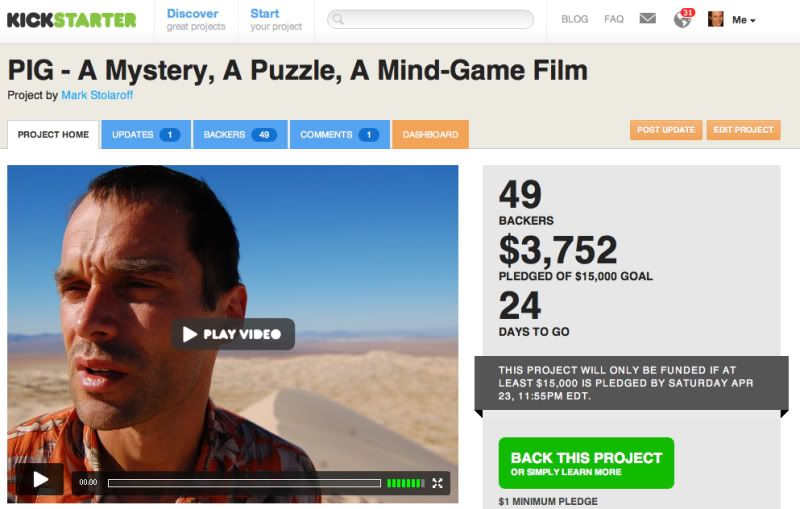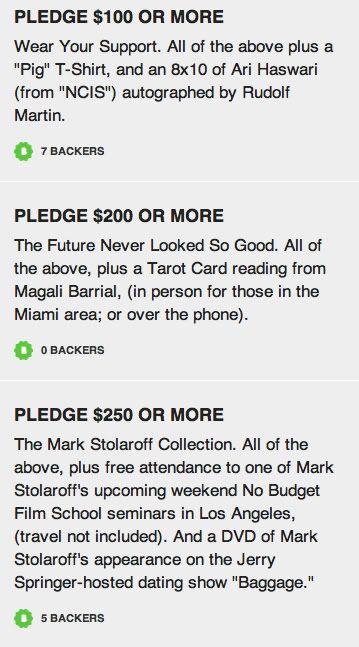|
The secret to making a no-budget film is pretty simple really, and not much of a secret. If you make a no-nonsense resource
assessment and build your project completely around those resources you already have available to you--if you write a script
for ONLY what you have in props, vehicles, costumes, locations, etc.; if you cast actors and hire crew who will work for free;
use borrowed or owned equipment; and so on, then your film doesn't have to cost one penny. The devil, of course, is in
the details, and what happens generally, even for the most diligent no-budget filmmakers, is there is something or someone
that they really need or want and they don't have access to it. For most of you, this is the situation you will be in
with your no-budget projects. You're going to need a little bit of cash to fund the Gap--the difference between what
you already have and what you need.  |
Kickstarter, the relatively new internet platform designed to help artists raise money for their creative projects, might be
just the solution to your cashflow needs. Like other crowdfunding sites, ( Indiegogo is another popular one), the Kickstarter concept relies on contributors receiving something tangible for their donation.
You provide various rewards at different funding levels. Your contributors are not investing in your project, so no worries
about Blue Sky laws and other securities regulations; and your contributors are not donating per se and getting a tax deduction,
so you don't have to achieve non-profit status or necessarily find a fiscal sponsor, (though with Indiegogo, you can include
this kind of approach). I recently embarked on a Kickstarter campaign for my new film Pig, which is set to world premiere in London and Nashville next month. We're finishing the film now and using
Kickstarter to raise funds to help us complete it. I did an awful lot of research before launching my campaign and while
my journey is far from over, I've gathered a few useful tips for any of you who might be contemplating a Kickstarter run.
(You can check out my page here: http://kck.st/hILgAs) 1.) Kickstarter can really pay off. The conventional wisdom used to be that Kickstarter was
only good for raising small amounts, start-up costs or finishing funds, amounts in the $10k-$20k range. First of all, if
you're a no-budget filmmaker, that can be your whole budget. Second, bigger amounts are being raised every day. Check
out Kickstarter's Hall of Fame. 2.) Kickstarter can be a bust. While some folks are raising over $100k, I've seen several
struggle to raise even $3k. You have to know your own strength. Do you really know 100's maybe 1000's of people
who will give you money? Is yours the type of project that will get passed all over the internet and funded by strangers,
(like this Indiegogo Hava Nagila project)? Do you have the time and intestinal fortitude to mount a successful campaign? Set your fundraising goal conservatively
and accordingly. Remember, it's all or nothing. 3.) Kickstarter is a lot of work, and it's
not for the feint of heart, the lazy, or the easily discouraged. I thought my film was a mind fuck; Kickstarter is the biggest
mind fuck there is! Some of your closest friends will ignore you. Others will give you hardly anything, even though you've
always been there for them. People with money will not share it. These are universal constants in the world of fundraising.
Still, others you don't know at all will support you, and many folks will surprise you in a good way. Get your self
esteem in it's best possible shape before attempting. See #11 about the hard work. 4.) The
conventional wisdom changes every day. In other words, there are really no rules. Every time there seems to be a rule or
a principle to follow, a new project comes along and breaks that rule and succeeds fabulously. The bottom line is, it's
just too early in Kickstarter's inception and things are developing too quickly for many hard and fast rules to take foot.
5.) Actually, there are some rules, at least I think there's some, (and of course, that's
why I'm writing this). I've visited countless Kickstarter pages and have donated to around 14 or 15 projects so far
on the two sites, and I've observed some good and bad practices. I will have more observations surely when this is all
done. 6.) Make a video. There's nothing less impressive than going to a Kickstarter page,
where there is the option to post a pitch video, and there is nothing but a still image. Personally, it just makes me think
you're being lazy. But more than that, you're missing a huge opportunity to reach out and grab your potential donors
by the balls. I can tell you with certainty that some of the most successful campaigns were successful due in a big part
to their videos. One of the most successful campaigns I know of, I Am I, which is being produced by a couple of friends of mine, raised well over $100k. Yes, they have celebrities in their
film and yes, the filmmaker worked her butt off to get the word out and establish relationships with donors, but it's
no coincidence that this project also had one of the most creative and impressive videos I've seen on Kickstarter. The
first thing I did after seeing it, (actually the second thing I did--the first thing I did was sigh at how much better their
video was than the one I was going to make), was pass it along to friends. I'm certain that most people passed it along.
The filmmakers reported that over 80% of their donations came from people they didn't know! So make a video, put yourself
in it, (no matter how bad you are on camera--see my video!), and be sincere. Talk directly to the camera, to your audience
of potential donors. Don't just run a trailer or a clip from your project. If you can come up with a clever idea or make
it look great or blow people away in some other fashion, then great. But if not, then be yourself and tell your story. Scrappy,
earnest videos go a long way on Kickstarter. 7.) Money is the third reason to do Kickstarter,
not the first. You will get money from people you don't know, which is why money isn't the most important reason
to launch a Kickstarter video. According to distribution strategist and crowdfunding expert Peter Broderick, the first reason to do Kickstarter is to get feedback on your project or on the way you talk about your project. If you're
about to spend $100k on a film that no one seems to give a shit about, you may want to re-evaluate that decision. The second
reason to do Kickstarter is to build awareness for your project and to build a network of people who, as Peter says, want
your project to succeed. I've heard many stories of Kickstarter supporters providing valuable resources to projects,
going way beyond money. And what I'm discovering about Kickstarter specifically, is you can raise "stranger dollars"
from the platform--money from people who just discovered you on the site. These are the best dollars because they represent
folks who were moved by your material so much they gave you money to see it succeed. No arm twisting of friends and relatives;
these are true fans.
 | 8.) Have low donation levels, like $1 or $5, and put something
really attractive at $20 or $25. Most people, even your bestest friends, are not necessarily going to give you a thousand
dollars. The most popular level is around $20, so make it count. If people are thinking of giving at that level and you
don't offer anything good there, they're going to give you less. On the flip side, if you have something great at
$30 or $50, then they might be temped to jump up to get that prize. I know I've given more than I thought I would to get
either a DVD or a t-shirt. And try to be creative with your rewards. Come up with stuff that relates to your film's
subject matter or is fun to talk about. Or if you can offer something of value that doesn't take money out of your pocket,
offer that. Maybe you're a wedding videographer or a graphic designer. I'm offering free attendance to one of my
weekend seminars and also free one-on-one consultations. Some of my favorite fun rewards were in the The Catechism Cataclysm project, (which didn't have a video, but they were in the middle of shooting their film and people ran to their
aid). 9.) Prime the pump before you really get the word out. Before you start blasting your
link all over the internet, send it to a few very close friends and essentially tell them to donate to you, (rather than ask
them to donate). You want to have some backers and some bucks before you start sending to people who know you less and might
be doubtful about contributing. There's nothing less impressive than clicking the link and seeing "1 Backer - $50
pledged of $100,000 goal." Most people will just assume you're never gonna make it and go about their business.
10.) Have an angel standing by. As I mentioned above, Kickstarter is all or nothing. If you
only receive $14,500 pledged of a $15,000 goal by the deadline, you get nothing. Have a deep-pocketed angel investor standing
by to drop in the needed bucks to make your goal. That might be your parents, that might be you. Yes, it will cost you 5%
(that's what Kickstarter charges for their service; there are also additional credit card fees), but it's better than
losing everything. Of course, the recommended form of action is to push your lists to jump in and save the campaign. That's
why there's a time limit in the first place, to create the sense of urgency. Make this work for you rather than against
you. BONUS TIP 11.) Be prepared, be really prepared before you start. Start collecting names
and email addresses of everyone you've ever known. Know how to speak to all the different groups of people you appeal
to--you'll speak to your best friends from high school differently than you would to your poor artist friends, or your
parents' friends. Spend the time to craft these different messages. Also, take the time to write personal emails to
your best prospects, rather than include them in a mass email. And get on the phone if you need to, or visit people in person.
I was able to do this when I went back home before launching. I showed my temp video to a number of friends for their feedback
and those were the ones who came through with support first. Realize that it's a war--you will win some battles and lose
some, but the goal is to come out ahead in the end. You will probably have a flurry of activity at the beginning and ending
of your campaign, and lag in the middle, so don't let that lag discourage you. That is
my report so far. I hope to send a follow-up when the campaign is done to cover any additional points I learn along the way.
Please feel free to email me if you have specific questions about doing this kind of thing. And visit my page as if you
were a donor. What parts do you respond to and what parts leave you cold? What would you copy and what would you do differently?
You might also visit the page for the project Lost To Love, from one of my former students. I think if you ask Stephen Les is this worth it, he'd say Yes. Kickstarter is
hard work, but it's valuable work, and it just might get your project off the ground.
ARCHIVED EDITIONS OF THE NO BUDGET REPORT:
|

